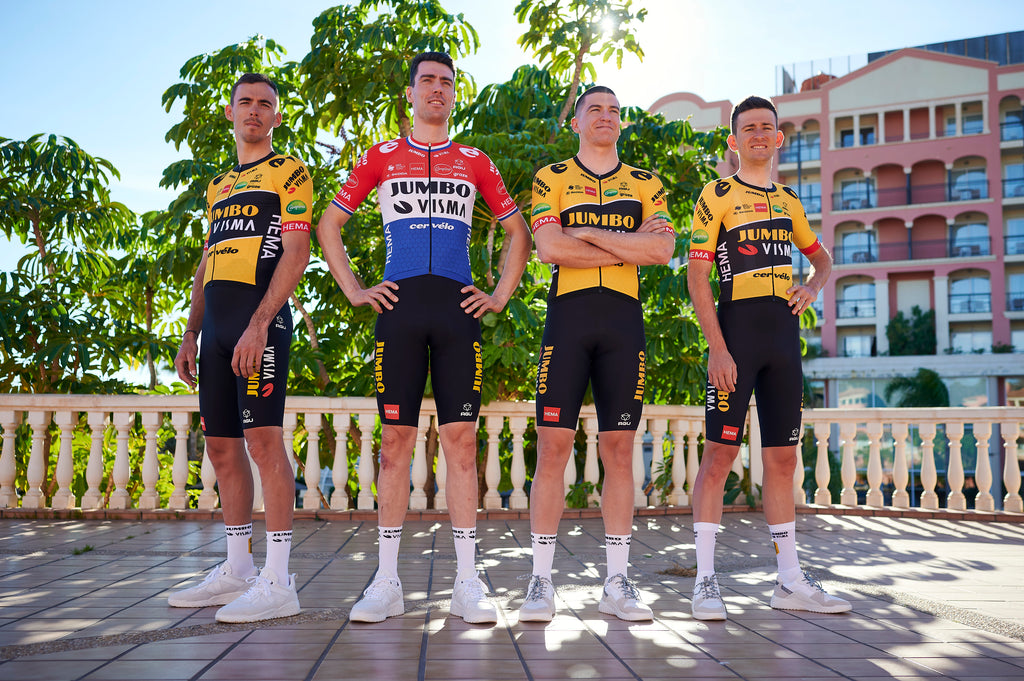The story of Jumbo Visma and 5 tips for training like a pro cyclist yourself.
The story of Jumbo Visma
Team Jumbo-Visma is a Dutch professional top sports team that focuses both on cycling and speed skating. In 2014 a speed skating and cycling team merged into “Team LottoNL-Jumbo”. The cycling team originated from former pro-teams Rabobank, Blanco and Belkin Pro Cycling Team. When LottoNL made their decision to stop the sponsoring known, Jumbo announced that they were going to invest heavily in the team. Later on, a Norwegian software company called Visma decided to sponsor Team Jumbo. They signed a contract for five years. Besides these 2 main sponsors, brands like Cycleur de Luxe, Cervélo, Hema and Vifit started sponsoring the team too. The most well-known riders of team Jumbo-Visma are Tom Dumoulin, Wout Van Aert and Primoz Roglic. Since 2020, Jumbo-Visma also started a development team. The goal is to let young talented riders grow into professional athletes. Guys like Olav Kooij and Gijs Leemreize made their way into the World Tour team after only one year in the development team. Since 2021 Jumbo-Visma started a women’s team as well. which is, without a doubt, a huge contribution to the growth of women’s cycling.

Now let's see how you can become a pro with these 5 tips to train like a pro yourself:
-
Recovery
This one might seem obvious, but tons of amateur cyclists make the mistake of not resting enough. Resting can be done both an active and passive way. Pro cyclists have at least one active recovery session every 3-4 training days. During an active recovery session you can do a short ride or just spin at very low intensity for an hour. This way your muscles get the chance to recover from the muscle fatigue caused the days before. A passive recovery session is just lying on the couch and not training at all. Sufficient resting is an absolute must! Make sure you get enough sleep so your muscles can recover from your efforts.

Another important part of resting is a rest period. You shouldn’t be in prime condition 365 days a year. That’s why most pro cyclists take a few weeks off during the winter. This allows their body to recover after which they can start building up to the new season.
-
Polarised training
The training of a pro cyclist contains a few “blocks” of heavy training in order to sufficiently stimulate the muscles. The “ideal” split should be around 75% low intensity and 25% high intensity. These high intensity parts can be sprint training, riding around on a big gear or just going all out for a few minutes. A well-known training is HIIT, also known as High Intensity Interval Training. These sudden peaks in performance are a bit like a race-day. This helps cyclists prepare for the effort needed in a road race.

-
Strength training
Incorporating strength training in your schedule is very important. Almost every if not all professional cyclists do strength training as it has tons of benefits.
- It improves bone strength and density, which decreases the chances of breaking a bone when falling.
- It reduces the chance of injury and promotes accelerated recovery.
- It enhances coordination and stability.
-
Increasing type IIa muscle fibres and muscle cross sectional area help increasing your VO2max.

Needless to say, weightlifting is absolutely necessary for becoming a professional cyclist. Good exercises for cyclists may include squats, deadlifts, lunges, calf raises and box jumps. Doing 2-3 sets every other day may already noticeably benefit your overall fitness.
-
Nutrition
You don’t become a pro cyclist just riding your bike and going to the gym, you also need to keep in mind that nutrition is essential. Your diet needs to contain a balanced amount of carbohydrates, fats, proteins, minerals and vitamins. Carbohydrates or carbs are what fuels the muscles, it gives you the energy needed for optimal performance. Protein is important for building and repairing muscle. Fats will often be limited as cyclists want to have a low amount of body fat.

Apart from food, supplements are also a big deal. Pro cyclists need sufficient amounts of vitamins and minerals. Due to their strict diets, they need some help with this, that’s why pro cyclists often take a few supplements.
-
Personalised coaching
As well as you might think you know stuff about training and recovering, a coach is still very important. Everyone’s body responds in another way to certain exercises and intensities. A personal trainer will allow you to find the perfect training schedule so you can unlock your true potential.

1 comment
Your description on the website is a good content for every beginner,Amateur,Elite and some Pros to learn to benefit him/She in their cycling career.
I am a cyclist from Ghana #Senyo-Ucandoit
